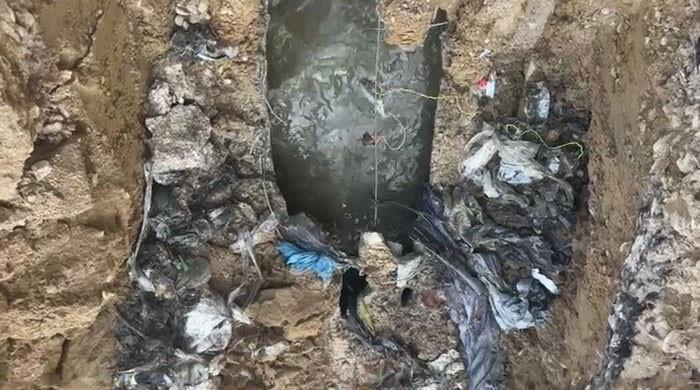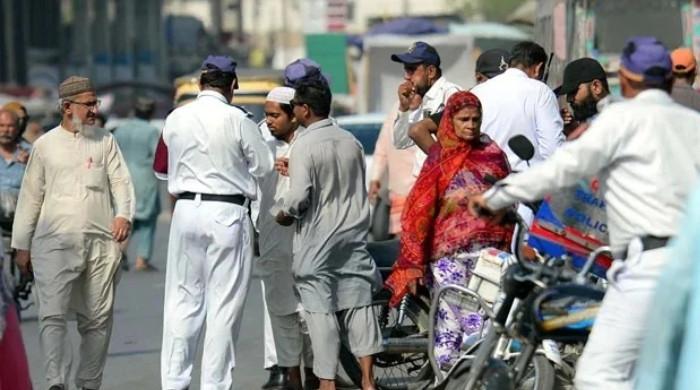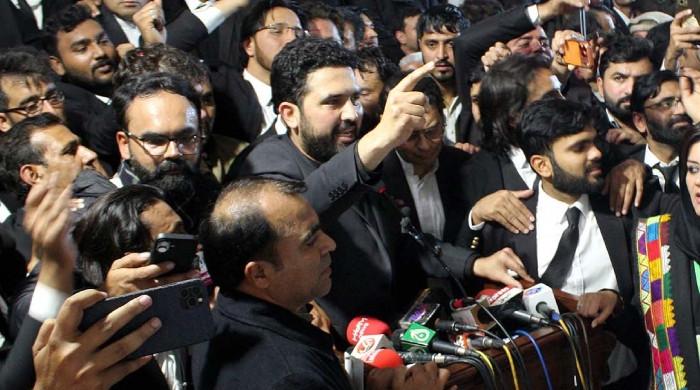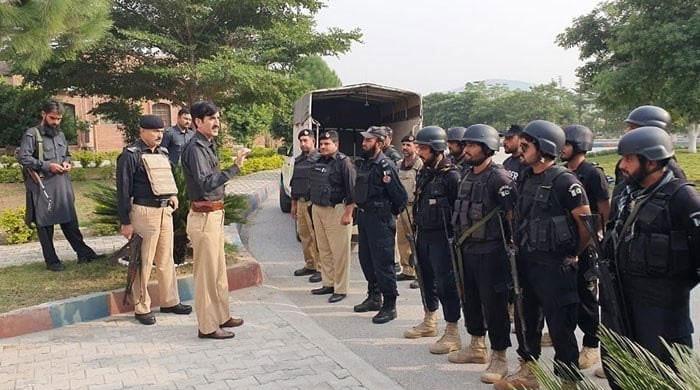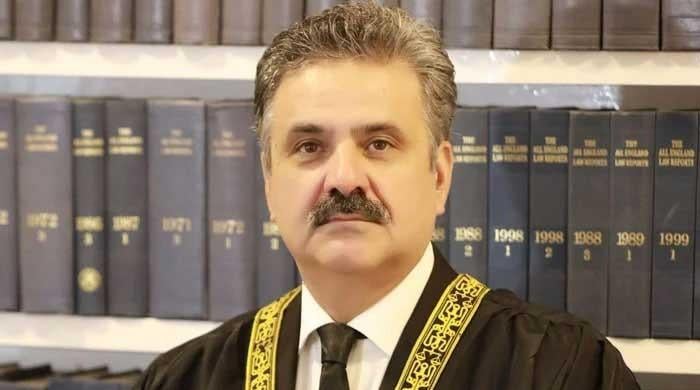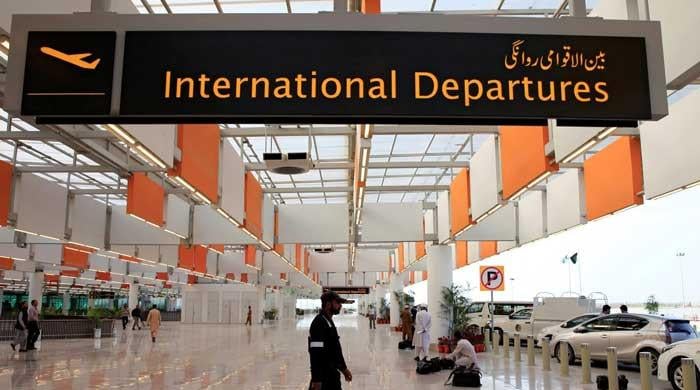Western Route of CPEC being ignored, Senate told
Senators ask govt to remove objections of smaller provinces
June 16, 2016
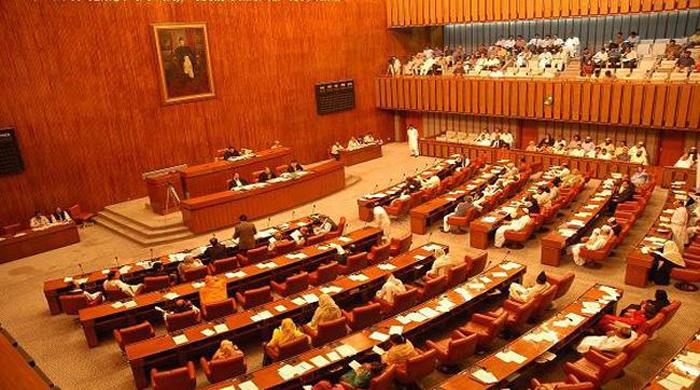
ISLAMABAD: Minister for Planning Ahsan Iqbal told the Senate on Wednesday that Rs35 billion had been allocated in the budget for the Western Route of China-Pakistan Economic Corridor (CPEC), as opposition senators warned the government against making it another ‘Afghan issue or Punjab-China Economic Corridor.’
Senator Taj Haider, who is the convener of the special committee on CPEC and several other senators, alleged that the government was working on CPEC without feasibility reports and PC-I and the Western Route was being totally ignored by the federal government and hence the rulers were bent upon making it the Punjab-China Economic Corridor.
During the debate on CPEC, the government was asked to remove objections of the smaller provinces. Ahsan Iqbal rejected the claims that only a meager amount had been earmarked in the budget for the Western Route. He said the government was giving priority to the Western Route and it had allocated Rs22 billion only for the Dera Ismail Khan-Burhan section in the new budget. He said significant work had also been done for the early ground-breaking of Gwadar International Airport. He added the governments of Balochistan and Khyber-Pakhtunkhwa were fully supporting the project after their reservations had been removed. Ahsan Iqbal said the government had also allocated Rs5.4 billion for the upgrading of the Indus Highway.
PPP Senator Farhatullah Babar raised questions over what he said was surreptitious manner in which the ordinance to amend the National Command Authority (NCA) had been laid before the Senate that sought to nullify court judges and laws, applicable to the organisations that come under the authority.
Senate Chairman Mian Raza Rabbani said a question might be raised why the ordinance promulgated on March 13 this year took the government 92 days to lay it in this House and 91 days to lay it in the National Assembly a day earlier.
Rabbani pointed out that the government did not lay the ordinance during the 247th session, 248th session and now today sought permission to lay it, which should have been laid during the 247th session. He added this also deprived the senators from having the right to move a disapproval resolution.
He contended that the inordinate delay was a breach of the Senate and parliament as well. He added this led to a question, what impact could this have. Rabbani then asked the Senate Secretariat to issue notices to the minister of law, minister of defence, leader of the opposition, Senator Muzaffar Hussain Shah of PML-F and PML-N’s Javed Abbasi to assist the chair on this matter.
Babar’s queries followed a controversy, which hit the House when the Senate chairman declined to allow laying of a report of the standing committee on law and justice on the bill to amend the Constitution to omit Article 182, raising an objection to the indulgence ofspecial assistant to prime minister in the committee proceedings, who had not taken oath as a state minister.
Rabbani had pointed out that there was a stranger in the law and justice committee’s output, representing the government, who was a special assistant to PM with the status of minister of state but had not taken oath as such. He also referred to the constitutional provisions and the rules of business and conduct of business in the House. He sought assistance from the committee chairman, Leader of Opposition Aitzaz Ahsan, MQM’s Barrister Muhammad Ali Saif and Muzaffar Shah.
It was the second consecutive day when the chairman showed ‘generosity’ and allowed members to speak on any point of national importance, enabling senators who were not present in the House to come and take part in the ongoing budget debate.
He commended the Senate chairman for already asking a pertinent question as to why the ordinance had been laid so late after 92 days of its signing by the president and said the matter needed to be probed.
Babar said that the ordinance sought to nullify court judgments and all existing laws applicable to the employees of organisations under the authority besides seeking unlimited funds for its functions beyond the purview of audit and without any oversight.
He said as a result of the amendment, all court orders and existing laws were rendered ineffective and non-applicable ‘unless approved by the federal government and published in the official gazette.’
“The court judgments and laws had their own force and do not depend upon ‘approval of the government and publication in the gazette’ for implementation,” he said and asked as to why this basic principle was bypassed. By the simple device of withholding publication in the official gazette, he noted, the employees of organisations under the authority will be denied their rights accrued under court orders and applicable laws.
Babar said that under another amendment, the federal government shall have to provide unlimited funds both in foreign and local currencies ‘as may be necessary’ without making provisions for justification, oversight and accountability.
He said that questions arose because the ordinance promulgated on March 13 was not placed before parliament for over 90 days during which three Senate sessions were also held. “It was laid today just when the Senate is about to be prorogued,” he said.
Babar proposed that the ordinance be referred to the committee for a review. The Senate chairman, however, said that under the law it could only be laid and that it could be referred to the committee only after it came up before parliament as a bill.
Replying to a calling attention notice, Minister for Commerce Khurram Dastgir Khan said that a comprehensive incentive package had been announced in the new budget to bolster the exports of textile products.
He pointed out the exports of value added products, including ready-made garments and knitwear, witnessed a growth during the outgoing financial year. The minister said the government was committed to supporting all export-oriented sectors and to equip them with the latest technology to achieve the objective of higher exports.
Raising a point of public importance, Fata Senator Aurangzeb Khan raised the issue of paucity of space at Pakistan’s consulate building in Dubai, where Pakistanis had to line up for hours for renewal of passports or any other job. He offered assistance in building the consulate anew, as he had enough experience and had a construction firm in Dubai.
Senator Tahir Mashhadi of the MQM agitated on the delay in putting in place of the local government system in Sindh, particularly in Karachi, despite the passage of five-six months, when the local bodies polls were held. He alleged a particular political party and community were being denied their rights this way.
PML-N’s Senator Chaudhry Tanvir Khan raised the issue of not taking proper care of whatever facilities were available at the PIMS. He also wondered why the sanitation staff was not doing its job to properly clean the hospital. He added even chiller plants were not functioning and MRI machines were also not in working condition.
The Senate chairman referred the matter, including the Poly Clinic Hospital, to the concerned committee for a report in three weeks.
Another PML-N Senator Abdul Qayyum drew the House’s attention towards the target killing of noted heart surgeon Dr Shahid Malik within the PIMS premises and lamented no progress was made in the case despite passage of many months. The chair referred this also to the committee on interior.
- Originally appeared in The News




